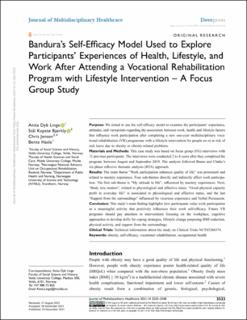| dc.contributor.author | Linge, Anita | |
| dc.contributor.author | Bjørkly, Stål | |
| dc.contributor.author | Jensen, Chris | |
| dc.contributor.author | Hasle, Bente | |
| dc.date.accessioned | 2023-02-24T13:09:54Z | |
| dc.date.available | 2023-02-24T13:09:54Z | |
| dc.date.created | 2021-12-23T22:44:20Z | |
| dc.date.issued | 2021 | |
| dc.identifier.citation | Journal of Multidisciplinary Healthcare. 2021, 14 3533-3548. | en_US |
| dc.identifier.issn | 1178-2390 | |
| dc.identifier.uri | https://hdl.handle.net/11250/3053930 | |
| dc.description.abstract | Purpose: We aimed to use the self-efficacy model to examine the participants’ experience, attitudes, and viewpoints regarding the association between work, health and lifestyle factors that influence work participation after completing a new one-year multidisciplinary vocational rehabilitation (VR) programme with a lifestyle intervention for people on or at risk of sick leave due to obesity or obesity-related problems. Materials and Methods: This case study was based on focus group (FG) interviews with 11 previous participants. The interviews were conducted 2 to 4 years after they completed the program, between August and September 2019. The analysis followed Braun and Clarke’s six-phase reflexive thematic analysis (RTA) approach. Results: The main theme “Work participation enhances quality of life” was prominent and related to mastery experience. Four sub-themes directly and indirectly affect work participation. The first sub-theme is “My attitude to life”, influenced by mastery experiences. Next, “Body size matters”, related to physiological and affective states. “Good physical capacity profit in everyday life” is associated to physiological and affective states, and the last “Support from the surroundings” influenced by vicarious experience and Verbal Persuasion. Conclusion: This study’s main finding highlights how participants value work participation as a meaningful activity that positively influences their work self-efficacy. Future VR programs should pay attention to interventions focusing on the workplace, cognitive approaches to develop skills for coping strategies, lifestyle change purposing BMI reduction, physical activity, and support from the surroundings. Clinical Trials: Technical information about the study on Clinical Trials NCT03286374. Keywords: obesity, self-efficacy, vocational rehabilitation, occupational health | en_US |
| dc.description.abstract | Bandura’s self-efficacy model used to explore participants’ experiences of health, lifestyle, and work after attending a vocational rehabilitation program with lifestyle intervention : a focus group study | en_US |
| dc.language.iso | eng | en_US |
| dc.relation.uri | https://doi.org/10.2147/JMDH.S334620 | |
| dc.rights | Navngivelse-Ikkekommersiell 4.0 Internasjonal | * |
| dc.rights.uri | http://creativecommons.org/licenses/by-nc/4.0/deed.no | * |
| dc.title | Bandura’s self-efficacy model used to explore participants’ experiences of health, lifestyle, and work after attending a vocational rehabilitation program with lifestyle intervention : a focus group study | en_US |
| dc.title.alternative | Bandura’s self-efficacy model used to explore participants’ experiences of health, lifestyle, and work after attending a vocational rehabilitation program with lifestyle intervention : a focus group study | en_US |
| dc.type | Journal article | en_US |
| dc.type | Peer reviewed | en_US |
| dc.description.version | publishedVersion | en_US |
| dc.source.pagenumber | 3533-3548 | en_US |
| dc.source.volume | 14 | en_US |
| dc.source.journal | Journal of Multidisciplinary Healthcare | en_US |
| dc.identifier.doi | 10.2147/JMDH.S334620 | |
| dc.identifier.cristin | 1971857 | |
| cristin.ispublished | true | |
| cristin.fulltext | original | |
| cristin.qualitycode | 1 | |

